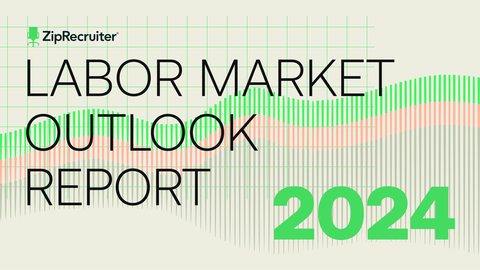ZipRecruiter Releases 2024 Industry Outlook Report
Company unveils new report featuring labor market deep dives for the future of work in 2024 across 10 key industries, including healthcare, construction, government, and education

ZipRecruiter 2024 Labor Market Outlook Report (Graphic: Business Wire)
“Even though growth remains uncertain in 2024, we’re on the verge of a second roaring twenties—with a twist,” said Julia Pollak, ZipRecruiter’s Chief Economist. “As investments in artificial intelligence, green technologies, semiconductors, cloud computing, infrastructure, and domestic supply chains pick up and bear fruit, pent-up demand for labor and business inputs will be unleashed, and the 2020s will become a decade of rapid growth and innovation, like the 1920s before them. Armed with data and key insights from our marketplace in this new report, leaders can make the most of the workforce opportunities presented in this time of rapid change.”
ZipRecruiter’s 2024 Labor Market Outlook features actionable insights regarding the top job characteristics workers want, current trends in employee benefits, evolving remote work practices, changes in educational requirements, and demographic and geographic trends, among others, across 10 key industries. These industries include: Construction; Education; Financial Services; Government; Healthcare; Hospitality; Manufacturing; Professional & Business Services; Retail; and Transportation & Warehousing.
Three Opportunities in 2024
The adoption of productivity-boosting artificial intelligence (AI) and the shift to greener technologies present several opportunities for employers to improve, modernize, and expand access to their jobs. From financial services employers aggressively recruiting AI talent to healthcare employers relaxing education requirements and prioritizing skills-based hiring, employers across the industries examined in the report are exploring new solutions to workforce challenges.
-
Increased productivity: The secret to growth and new jobs.
After an initial period of dabbling in hiring AI talent, employers are now doubling down on AI in fields from healthcare research to loan underwriting where the technology is showing the greatest promise. Demand for AI tools is creating attractive jobs for top tech talent, but also beginning to transform the jobs of service workers who will be the primary users of such tools and who stand to reap significant productivity benefits. -
Job modernization: A strategic response to shrinking talent pools.
In many industries, from skilled trades to accounting, employers are confronting waves of retirements. In addition, many are simultaneously facing shrinking talent pipelines, due to declining enrollment in training programs and a shift in job seeker interest from traditional jobs to more flexible remote and online roles. As forward-thinking employers adopt new AI-based technologies and sustainable practices, they have an opportunity to appeal to new generations of talent by reimagining the jobs they offer and helping candidates develop the skills they need to make the leap. -
Skills-based hiring: Addressing staffing shortages while building a more inclusive workforce.
In just the past year, majorU.S. companies, as well as state and local governments, have substantially rethought job requirements, removing the bachelor’s degree as a requirement for most jobs. The proliferation of online certification programs and pre-employment skills assessment tools has given employers an alternative gauge of candidate quality. Generative AI could also change the skills workers need. Early research finds that giving non-technical service workers access to generative AI tools boosts productivity most for the least skilled workers, bringing them up to speed more quickly. That finding suggests that, rather than displacing less educated workers, generative AI could make them more productive and valuable, lowering barriers to entry and increasing opportunity while relaxing the labor supply constraint holding many businesses back.
Additional Workplace Trends
Alongside trends in new technologies, we are also seeing an evolution in workplace norms. Whether they’re facing a wave of retirements or struggling to hire workers for onsite roles, companies across the industries explored in the report are increasingly investing in creative and innovative offerings to attract and retain talent.
-
Workplace innovation: Competing for talent with remote, hybrid, or reimagined workplaces.
Remote roles on ZipRecruiter continue to attract vastly more applicants than similar roles in more traditional settings. The enduring popularity of remote work presents opportunities for employers in business services and other industries where it is feasible to offer flexibility, work-life balance, and autonomy. It also creates an imperative for traditional onsite employers to differentiate themselves by fostering a thriving team environment and competing on schedule flexibility, pay, and benefits. Before tech companies shifted to remote and hybrid models during the pandemic, they had been at the forefront of transforming traditional offices into innovative and employee-centric work environments. Increasingly, schools, hospitals, and warehouses, struggling to recruit and retain workers, will face pressure to adopt bold new standards for workplace design and employee experience. -
Responsive workplace benefits: A corrective to recent challenges.
Employers are increasingly using employee benefits as key recruitment differentiators, advertising them more frequently in job postings, and in greater detail. Mentions of benefits of many kinds rose broadly in job postings on ZipRecruiter over the past year, even as advertised wages were relatively flat. The fastest-growing benefits were sick leave (offered in252% more job postings in 2023 than 2022), and student loan repayment assistance (+64% ). The former is largely a reaction to the recent experience of the pandemic, and the latter is a response to rising job seeker and employee concern about the college affordability crisis. By following social trends and responding to employee concerns and challenges, employers have an opportunity to broaden their appeal and relevance.
To read the report in its entirety, visit ZipRecruiter’s Economic Research website at ZipRecruiter-Research.org.
About ZipRecruiter
ZipRecruiter® (NYSE:ZIP) is a leading online employment marketplace that actively connects people to their next great opportunity. ZipRecruiter’s powerful matching technology improves the job search experience for job seekers and helps businesses of all sizes find and hire the right candidates quickly. ZipRecruiter has been the #1 rated job search app on iOS & Android for the past seven years1 and is rated the #1 employment job site by G2.2 For more information, visit ziprecruiter.com.
1Based on job seeker app ratings, during the period of January 2017 to January 2024 from AppFollow for ZipRecruiter, CareerBuilder, Glassdoor, Indeed, LinkedIn, and Monster.
2Based on G2 satisfaction ratings as of December 18, 2023.
View source version on businesswire.com: https://www.businesswire.com/news/home/20240118108423/en/
Claire Walsh, Press Relations
press@ziprecruiter.com
Source: ZipRecruiter, Inc.







